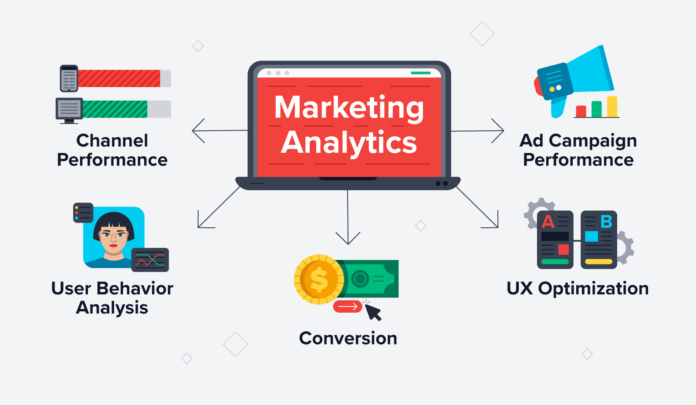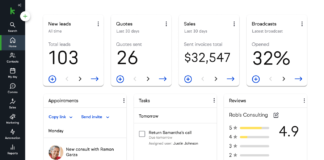Understanding how your marketing efforts perform is crucial for success. Marketing analytics provides the insights needed to make informed decisions.
Marketing analytics refers to the process of measuring and analyzing marketing performance. It helps businesses understand what works and what doesn’t, allowing them to optimize their strategies. By using marketing analytics, companies can track various metrics such as engagement, conversion rates, and ROI. This data-driven approach enables businesses to allocate resources more effectively and improve their overall marketing outcomes. Whether you are a small business or a large corporation, leveraging marketing analytics can drive growth and increase revenue. Ready to take your marketing to the next level? Consider using a comprehensive tool like GetResponse. This all-in-one platform offers email marketing, automation, content monetization, and more to help you grow your business efficiently.
Introduction To Marketing Analytics
In today’s digital age, understanding how to leverage data is crucial for effective marketing. Marketing analytics helps businesses make informed decisions, optimize campaigns, and increase ROI. Let’s delve into the basics and significance of marketing analytics.
Understanding Marketing Analytics
Marketing analytics involves collecting, analyzing, and interpreting data related to marketing activities. It helps businesses understand their audience, measure campaign effectiveness, and improve strategies. Key components include:
- Data Collection: Gathering data from various sources like social media, emails, and web traffic.
- Data Analysis: Using statistical methods and tools to extract meaningful insights.
- Reporting: Presenting data in a user-friendly format for decision-makers.
The Importance Of Data-driven Decisions In Marketing
Data-driven decisions are essential for successful marketing. By leveraging data, businesses can:
- Optimize Campaigns: Identify what works and what doesn’t, and adjust strategies accordingly.
- Enhance Customer Experience: Personalize marketing efforts based on customer behavior and preferences.
- Increase ROI: Allocate resources efficiently to maximize returns.
Marketing analytics tools like GetResponse provide comprehensive insights to help businesses grow. With features like email marketing, automation, and content monetization, GetResponse empowers users to make informed, data-driven decisions.
| Feature | Description |
|---|---|
| Email Marketing & Automation | Grow your list, nurture subscribers, and optimize campaigns with actionable analytics. |
| Content Monetization Plan | Create courses, premium newsletters, and webinars with AI-powered tools. |
With GetResponse, businesses can integrate e-commerce data, promote products using AI insights, and engage customers across multiple channels. This all-in-one platform simplifies marketing and drives revenue growth.

Credit: www.interodigital.com
Key Features Of Effective Marketing Analytics Tools
Effective marketing analytics tools can significantly enhance your marketing efforts. They offer valuable insights and help make data-driven decisions. Below are key features to look for in these tools.
Real-time Data Collection And Analysis
Real-time data collection is essential. It allows businesses to respond swiftly to market changes. With real-time analysis, you can monitor the effectiveness of your campaigns immediately. This leads to timely adjustments and better outcomes.
- Instant feedback on marketing activities
- Quick identification of trends
- Enhanced decision-making process
Comprehensive Data Visualization
Data visualization is another critical feature. It helps in understanding complex data through visual elements. Charts, graphs, and dashboards make data interpretation easier. This feature is essential for presenting data to stakeholders.
| Benefits | Description |
|---|---|
| Improves comprehension | Visual elements simplify complex data |
| Facilitates decision-making | Clear visuals help in making informed decisions |
| Enhances reporting | Easy to present data to stakeholders |
Predictive Analytics Capabilities
Predictive analytics capabilities are vital for future planning. These tools use historical data to forecast future trends. They help in identifying potential opportunities and risks. This leads to better strategic planning.
- Forecasts future trends
- Identifies potential opportunities
- Recognizes possible risks
GetResponse, an all-in-one marketing software, offers many of these features. It combines email marketing, automation, and content monetization. This makes it a comprehensive tool for growing your business.
For more information, visit the GetResponse website.
How Marketing Analytics Tools Benefit Businesses
Marketing analytics tools like GetResponse offer significant benefits for businesses. They provide actionable insights, optimize marketing efforts, and improve overall return on investment (ROI). Here are some key ways these tools can benefit your business:
Enhanced Customer Insights And Segmentation
Marketing analytics tools offer deep insights into customer behavior and preferences. These tools help businesses understand customer demographics, buying patterns, and engagement levels. This data allows businesses to segment their audience effectively and create targeted marketing strategies.
| Feature | Benefit |
|---|---|
| Data-driven Segmentation | Group customers based on behavior and preferences |
| Behavior-triggered Emails | Send personalized messages to engage customers |
| AI-powered Insights | Understand customer needs and improve targeting |
Optimized Marketing Campaigns
With analytics tools, businesses can optimize their marketing campaigns. These tools help identify which campaigns are performing well and which need improvement. By analyzing data, businesses can make informed decisions to enhance their marketing strategies.
- Track campaign performance in real-time
- Adjust strategies based on data insights
- Utilize AI-powered recommendations for better results
- Automate marketing tasks to save time and resources
Improved Roi Tracking
Marketing analytics tools provide comprehensive ROI tracking. Businesses can measure the effectiveness of their marketing efforts and understand the return on investment for each campaign. This helps in allocating resources efficiently and maximizing profits.
- Track sales and conversions from campaigns
- Analyze cost-per-acquisition (CPA) and customer lifetime value (CLV)
- Identify high-performing channels and focus investments
- Use data to justify marketing spend and strategy adjustments
GetResponse offers all these benefits and more. Its all-in-one platform combines email marketing, automation, and content monetization to help businesses grow. With a user-friendly interface and AI-powered features, GetResponse makes it easy to optimize marketing efforts and boost revenue.
For more details, visit the GetResponse website and explore their comprehensive range of features and pricing plans.
Popular Marketing Analytics Tools And Their Unique Features
Marketing analytics tools are essential for understanding customer behavior, optimizing campaigns, and driving business growth. Each tool offers unique features that cater to different marketing needs. Here, we explore some popular marketing analytics tools and highlight their distinctive features.
Google Analytics
Google Analytics is a free tool that provides in-depth insights into website traffic and user behavior. It helps businesses understand how visitors interact with their website.
- Real-Time Data: Monitor live user activity on your site.
- Audience Insights: Gain demographic and interest data about your visitors.
- Behavior Tracking: Understand user journeys and interaction patterns.
- Conversion Tracking: Measure the success of your marketing campaigns.
- Integration: Seamlessly integrates with other Google tools and third-party platforms.
Hubspot Analytics
HubSpot Analytics is a comprehensive tool that integrates with the HubSpot CRM, providing detailed insights into marketing, sales, and customer service.
- All-in-One Dashboard: Centralizes data from marketing, sales, and service.
- Lead Tracking: Monitor and analyze lead behavior and engagement.
- Campaign Performance: Measure the effectiveness of your marketing campaigns.
- Custom Reports: Create detailed reports tailored to your business needs.
- Integration: Syncs with various third-party applications and tools.
Mixpanel
Mixpanel focuses on product analytics, offering detailed insights into user interactions with your product or service.
- Event Tracking: Track user actions and events within your product.
- Funnel Analysis: Visualize user pathways and identify drop-off points.
- Retention Analysis: Measure user retention over time.
- A/B Testing: Test different product features and measure their impact.
- Advanced Segmentation: Segment users based on various criteria for targeted analysis.
Kissmetrics
Kissmetrics is designed to help businesses understand user behavior, track conversions, and optimize marketing strategies.
- Behavioral Analytics: Track user interactions across multiple touchpoints.
- Customer Journey Mapping: Visualize the entire customer journey.
- Revenue Reporting: Connect marketing efforts to revenue outcomes.
- Segmentation: Segment users based on behavior and characteristics.
- Integration: Integrates with various marketing and sales tools.
These tools provide valuable insights that can help businesses make data-driven decisions. By leveraging their unique features, you can optimize your marketing strategies and drive business growth.
Pricing And Affordability Of Marketing Analytics Tools
Understanding the pricing and affordability of marketing analytics tools is crucial for businesses of all sizes. These tools can vary significantly in cost, depending on the features and level of support offered. In this section, we will explore the differences between free and paid tools, as well as various subscription models and pricing tiers.
Free Vs. Paid Tools
Many marketing analytics tools offer both free and paid versions. Free tools can be a great starting point for small businesses or those new to marketing analytics. They typically offer basic features, such as:
- Basic data tracking
- Limited reports and dashboards
- Basic customer segmentation
Paid tools, on the other hand, provide more advanced features and greater flexibility. These might include:
- Advanced analytics and reporting
- Customizable dashboards
- AI-powered insights
- Behavior-triggered automations
- Enhanced customer support
GetResponse offers a comprehensive toolset that combines email marketing, automation, and content monetization. While it starts at $19/month, it provides extensive features that can grow with your business.
Subscription Models And Pricing Tiers
Many marketing analytics tools use a subscription-based pricing model. This allows businesses to choose a plan that fits their needs and budget. Common pricing tiers include:
| Plan | Features | Price |
|---|---|---|
| Standard Plan |
|
$19/month |
| GetResponse MAX |
|
Custom pricing |
| Content Monetization Plan |
|
$69/month |
Each tier caters to different business needs and budgets. This ensures that whether you’re a startup or a large enterprise, there’s a plan that suits your requirements.
Additionally, GetResponse offers a 30-day free trial with no credit card required. This allows businesses to test the platform before committing to a paid plan.

Credit: www.mailmodo.com
Pros And Cons Of Using Marketing Analytics Tools
Marketing analytics tools offer many benefits and come with some challenges. Understanding these helps businesses make the most of these tools.
Advantages Of Implementing Analytics
- Data-Driven Insights: Analytics tools provide detailed insights into customer behavior. This helps tailor marketing strategies effectively.
- Improved Decision Making: With accurate data, businesses can make informed decisions. This reduces guesswork and increases efficiency.
- Cost Efficiency: Identifying high-performing campaigns allows for better allocation of resources. This helps in reducing marketing costs.
- Targeted Marketing: Analytics tools enable targeted promotions. This results in higher conversion rates and improved ROI.
- Customer Retention: Using behavior-triggered emails and automated responses helps in maintaining customer engagement. This boosts retention rates.
Common Challenges And Limitations
- Data Overload: Too much data can be overwhelming. It may lead to analysis paralysis where decision-making is delayed.
- Complexity: Some analytics tools can be complex to set up and use. This may require technical expertise and training.
- Cost: High-quality analytics tools can be expensive. This might be a barrier for small businesses with limited budgets.
- Privacy Concerns: Collecting and analyzing customer data raises privacy issues. It is essential to comply with data protection regulations.
- Data Accuracy: Inaccurate data can lead to flawed insights. Ensuring data quality is crucial for reliable analytics.
| Pros | Cons |
|---|---|
| Provides data-driven insights | Can lead to data overload |
| Improves decision making | May be complex to use |
| Reduces marketing costs | Can be expensive |
| Enables targeted marketing | Raises privacy concerns |
| Boosts customer retention | Data accuracy issues |
Recommendations For Choosing The Right Marketing Analytics Tool
Choosing the right marketing analytics tool can significantly impact your business growth. An effective tool helps you understand your audience, optimize campaigns, and boost revenue. This section provides recommendations to assist in selecting the ideal tool for your needs.
Factors To Consider Based On Business Needs
Understanding your business needs is crucial before choosing a marketing analytics tool. Here are some key factors to consider:
- Business Size: Small businesses may need simpler tools, while larger enterprises require more robust solutions.
- Budget: Evaluate the pricing plans and choose a tool that fits your budget. For example, GetResponse offers plans starting from $19/month.
- Features: Identify essential features like email marketing, automation, and content monetization. GetResponse provides a comprehensive toolset including AI-powered email marketing and data-driven segmentation.
- Ease of Use: Ensure the tool is user-friendly and offers a seamless experience. GetResponse is known for its intuitive interface and AI-powered features.
- Integration: Check if the tool integrates with your existing systems. GetResponse supports over 170 tools, making it highly adaptable.
- Customer Support: Reliable customer support is vital. GetResponse provides 24/7 support from a 5-star rated team.
Scenarios Where Specific Tools Excel
| Scenario | Recommended Tool | Key Features |
|---|---|---|
| Small Business with Limited Budget | GetResponse | Affordable plans, AI-powered email marketing, unlimited emails |
| Need for Comprehensive Analytics | GetResponse | Actionable analytics, behavior-triggered emails, data-driven insights |
| Content Monetization | GetResponse | AI-powered course creator, premium newsletters, seamless payment gateways |
| High-Volume Email Campaigns | GetResponse MAX | High-volume infrastructure, AI conversion tools, multi-user support |
Choosing the right marketing analytics tool involves understanding your business needs and evaluating various scenarios. With its comprehensive features, GetResponse excels in multiple aspects, making it a top choice for businesses of all sizes.

Credit: online.hbs.edu
Conclusion: Unlocking Data-driven Success In Marketing
Marketing analytics has become a cornerstone for successful marketing strategies. It allows businesses to make informed decisions based on data, leading to more effective campaigns. By leveraging tools like GetResponse, companies can harness the power of analytics to boost their marketing efforts. Let’s explore the future of marketing analytics and the importance of embracing data-driven strategies.
The Future Of Marketing Analytics
The future of marketing analytics promises more sophisticated tools and techniques. AI-powered insights will become increasingly important. They will help marketers predict trends and understand customer behavior better. Platforms like GetResponse will continue to evolve, offering even more advanced analytics features. These advancements will enable businesses to create highly personalized marketing campaigns, improving customer engagement and driving revenue growth.
Final Thoughts On Embracing Data-driven Strategies
Embracing data-driven strategies is crucial for modern marketing success. Tools like GetResponse provide a comprehensive solution, combining email marketing, automation, and content monetization. By utilizing data-driven insights, businesses can optimize their marketing efforts, retain customers, and increase sales. The ease of use and powerful features of GetResponse make it an ideal choice for businesses looking to grow and boost revenue. Start leveraging data-driven marketing today to achieve better results and stay ahead of the competition.
Frequently Asked Questions
What Is Marketing Analytics?
Marketing analytics is the practice of measuring, managing, and analyzing marketing performance. It helps marketers optimize their strategies. The goal is to maximize return on investment (ROI) and improve decision-making.
Why Is Marketing Analytics Important?
Marketing analytics is crucial because it provides insights into customer behavior. It helps businesses understand what works and what doesn’t. This leads to more effective marketing strategies and better resource allocation.
How Does Marketing Analytics Work?
Marketing analytics works by collecting data from various sources. It then processes and analyzes this data to provide actionable insights. These insights help businesses make data-driven decisions.
What Tools Are Used In Marketing Analytics?
Common tools in marketing analytics include Google Analytics, HubSpot, and Adobe Analytics. These tools help track and analyze marketing performance. They provide valuable insights into customer behavior and campaign effectiveness.
Conclusion
Effective marketing analytics drives better decisions. Understanding data enhances campaign results. Tools like GetResponse offer comprehensive solutions for businesses. Its features include email marketing and automation, all in one platform. Grow your business efficiently. For more details, visit the GetResponse website.












